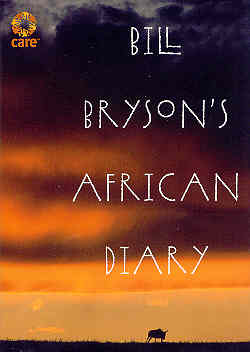Bill Bryson's African
Diary
Bill Bryson

“In the late 1940s and early 1950s after he became a little too saggy to fit into a Tarzan loincloth without depressing popcorn sales among cinema audiences, the great Johnny Weissmuller filled the twilight years of his acting career with a series of low-budget adventure movies with titles like Devil Goddess and Jungle Moon Men, all built around a character called Jungle Jim. These modest epics are largely forgotten now, which is a pity because they were possibly the most cherishably terrible movies ever made.”
So begins Bill Bryson's small and charming African Diary, written during a trip the author made to Kenya at the invitation of CARE International, the charity dedicated to working with local communities to eradicate poverty around the world. Bryson goes on to elaborate on the Jungle Jim films, before moving into the real heart of his diary:
“The plots seldom got anywhere near coherence. My own favorite, called Pygmy Island, involved a lost tribe of white midgets and a strange but valiant fight against the spread of Communism. But the narrative possibilities were practically infinite since each Jungle Jim feature consisted in large measure of scenes taken from other, wholly unrelated adventure movies. Whatever footage was available – train crashes, volcanic eruptions, rhino charges, panic scenes involving large crowds of Japanese – would be snipped from the original and woven into Jungle Jim's wonderfully accommodating story lines. From time to time, the ever-more-fleshy Weissmuller would appear on the scene to wrestle the life out of a curiously rigid and unresisting crocodile or chase some cannibals into the woods, but these intrusions were generally brief and seldom entirely explained.
... What is especially tragic about all this is that I not only watched these movies with unaccountable devotion, but was indelibly influenced by them. In fact, were it not for some scattered viewings of the 1952 classic Bwana Devil and a trip on the Jungle Safari ride at Disneyland in 1961, my knowledge of African life, I regret to say, would be entirely dependent on Jungle Jim movies.
I can't say that it actively preyed on me that my impressions of Africa were based so heavily on a series of B-movies made in California more than half a century ago, but when a personable young man named Dan McLean from the London office of CARE International, the venerable and worthy charity, asked me if I would be willing to go to Kenya to visit some of their projects and write a few words on their behalf, it occurred to me that there were some gaps in my familiarity with the Dark Continent that I might usefully fill in. So I agreed.”
Thus, Bryson found himself taking in the incredible contrasts of a post-colonial society in transition: the meticulously tended grounds of Karen Blixen's house and the wrenching poverty of a Nairobi slum; the human fossil riches of the National Museum and the refuge camps where CARE staff members wage war against poverty, dislocation, and corruption. As with all of Bryson's writings, his African Diary can make one laugh, think, and, especially, feel, all at the same time. Be sure to read all about it.
All Rights Reserved.